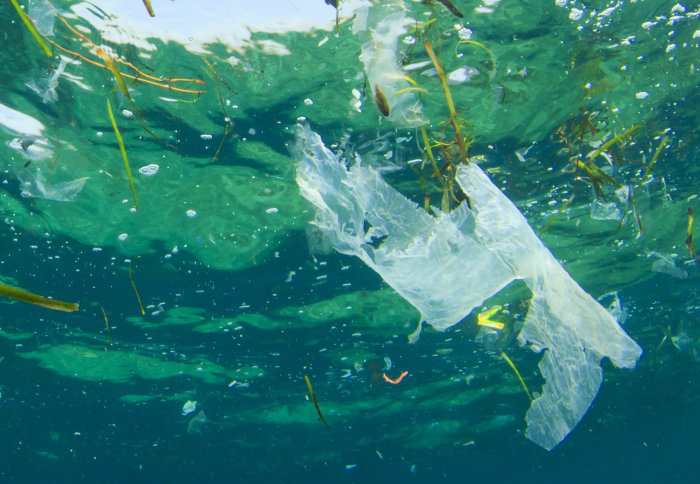Sky teams up with Imperial academics to tackle plastic waste
by Simon Levey

Leading experts from Imperial College London and global media company Sky Plc are to work together to prevent an avalanche of ocean plastic waste.
Sky Ocean Ventures and Imperial’s Grantham Institute – Climate Change and the Environment, have agreed to work together on their common goals to protect the environment by supporting promising business and scientific innovations and sharing inspiring messages about the benefits to our planet of eliminating plastic waste.
Internationally-renowned academics and enthusiastic entrepreneurs from the Grantham Institute will explore solutions at all stages of the problem that sees more than 5 million tonnes of plastic enter the ocean each year (1). On current trends, there will be more plastic than fish in the ocean by 2050, according to sailor and campaigner Dame Ellen MacArthur.
The partnership is led at Imperial by the Grantham Institute – Climate Change and the Environment, and harnesses the academic expertise of the College's Ocean Plastic Solutions Network. Grantham Institute experts gave evidence to the UK government that was instrumental in bringing about a UK-wide ban on micro-plastic particles in cosmetic products in 2016.
Sky Ocean Ventures is on a mission to find ideas that will help save our oceans from drowning in plastic. Its impact investment model, anchored with a £25 million commitment from Sky plc, is committed to fostering an innovation ecosystem to achieve this goal.
Through a new Memorandum of Understanding signed on 1 June, the two partners aim to identify investable ideas and create employment opportunities by understanding the movement of plastics across oceans; developing technologies for its recovery; creating more environmentally friendly materials; and designing new waste management systems that increase plastic recycling or reuse.
Plastic's fantastic, but not in the ocean

Plastic pollution in the ocean is a global problem that requires immediate, coordinated action. Over 335 million tonnes of plastic are produced each year (2), with valuable uses including protective food packaging, strong construction materials and light components for many everyday products. However, when plastics are improperly discarded they can kill wildlife, damage ecosystems and impact the livelihood of entire societies.
Professor Martin Siegert is Co-Director of the Grantham Institute, and leads the partnership for Imperial. He says: "Plastic is a fantastic and hugely popular material, being light, cheap and versatile, and we should value rather than waste it. My research takes me to the Southern Ocean of Antarctica, where I have seen first-hand the effects of improperly discarded plastic on the environment.
"There is a global momentum to stop the wave of plastics being wasted by our society, prevent further plastic pollution, and engineer an effective clean-up effort. I welcome this timely opportunity for the experts we have at Imperial to collaborate with a globally-reaching organisation like Sky, so that together we can help turn the tide on this challenge."
New investments announced
Fred Michel, Director of Sky Ocean Ventures said: “We’re delighted to have the Grantham Institute at Imperial College London on board. We are looking forward to working with them to find more investable ideas that will stop our oceans from drowning in plastic.”
Sky Ocean Ventures is part of Sky Ocean Rescue which aims to inspire everyone – including other businesses - to make simple, everyday changes to help save our oceans. Sky Ocean Ventures works with start-ups and other businesses to create innovative ways to eradicate single-use plastic with a cornerstone commitment of £25 million, as well as working with other partners now including the Grantham Institute at Imperial College London.

The new partnership will include activities that stimulate the imagination of scientists, budding entrepreneurs and business-people to draw out ideas in unexpected areas. It will pave the way for skills, training and support by experienced innovation leaders, creating investment opportunities and jobs.
At Imperial's new White City innovation campus, experts from the Grantham Institute will be convening and contributing scientific expertise to projects that seek to eliminate plastic waste, designing and running student challenges to encourage innovative ideas and workable solutions.
--
(1) Plastic waste inputs from land into the ocean, Science, 13 Feb 2015
(2) Plastics - The facts 2017 (p16), produced by PlasticsEurope, Jan 2018. Includes plastic materials (thermoplastics and polyurethanes) and other plastics (thermosets, adhesives, coatings and sealants). Does not include: PET fibers, PA fibers, PP fibers and polyacryls-fibers.
Main image credit: richcarey Stock photo ID:507686141
Article text (excluding photos or graphics) © Imperial College London.
Photos and graphics subject to third party copyright used with permission or © Imperial College London.
Reporter
Simon Levey
Communications Division
